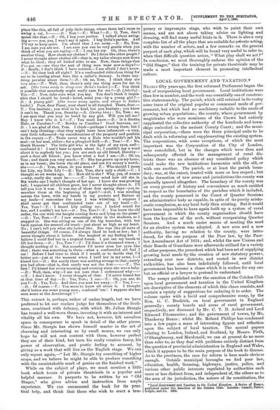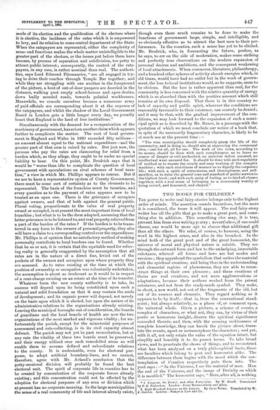LOCAL GOVERNMENT AND TAXATION.*
NEARLY fifty years ago, the first reformed Parliament began the task of reorganising local government. Local institutions were then few in number, and the work was essentially one of construc- tive statesmanship. The parish, which still retained in its vestry some trace of the original popular or communal mode of gov- ernment, but which had no machinery suitable to the needs of growing urban populations ; the county, where government by magistrates who were nominees of the Crown had entirely supplanted the collective authority of the hundreds and town- ships embodied in the ancient County Court ; and the muni- cipal corporation,—these were the three principal units to be dealt with in reforming and supplementing the existing system. The corporations, with some exceptions, of which the most important was the Corporation of the City of London, were remodelled, but in the changes which were then and subsequently effected in the management of rural dis- tricts there was an absence of any considered policy which could make the new institutions harmonise with the old, or with one another. The parish, or at least the parish boun- dary, was, at the outset, treated with more or less respect ; but in the formation of new areas and jurisdictions the county was generally ignored altogether. The boundary of the county was on every ground of history and convenience as much entitled to respect as the boundaries of the parishes which it included, and the county possessed in the Court of Quarter Sessions an administrative body as capable, in spite of its purely aristo- cratic complexion, as any local body then existing. But it would have been impossible to have again built up a system of rural government in which the county organisation should have been the keystone of the arch, without reorganising Quarter Sessions. And a much easier means of meeting the need for an elective system was adopted. A new area and a new authority, having no relation to the county, were intro- duced, for the one purpose of the Poor law, by the Poor- law Amendment Act of 1834; and, whilst the new Unions and their Boards of Guardians were afterwards utilised for a variety of other purposes, the precedent which had been set of supplying growing local needs by the creation of new statutory powers, extending over new districts, and vested in new district authorities, has also been indefinitely followed, until local government has become a chaos which it is useless for any one but an official or a lawyer to pretend to understand.
The essays published under the sanction of the Cobden Club upon local government and taxation in the United Kingdom are descriptive of the elements of which this chaos consists, and contain a variety of suggestions for reducing it to order. The volume opens with a lucid and comprehensive essay, by the Hon. G. C. Brodrick, on local government in England generally ; county boards and areas of rural government, respectively, are discussed by Mr. C. T. D. Acland and Lord Edmond Fitzmaurice ; and the goirernment of towns, by Mr. Thackeray Bunce ; whilst Mr. Roland Phillips has condensed into a few pages a mass of interesting figures and reflection upon the subject of local taxation. The special papers relating to London, Ireland, and Scotland, by Messrs. Firth, O'Shaughnessy, and Macdonald, we can at present do no more than refer to, as they deal with problems entirely distinct from the question of provincial administration in England and Wales, which it appears to be the main purpose of the book to discuss. As to the provinces, the case for reform is here made obvioas enough. Outside municipal boroughs we find poor law, education, health, licensing, highways, justice, police, and various other public interests regulated by authorities each more or less distinct from, and independent of, the others as to the area of its jurisdiction, the nature of its constitution, the 'Local Government and Tanalion the United Kingdom. A Series of Essays, published under the Sanction of the Cobden Club. London: Cassell, Patter, tealpin, and Co. 11382.
mode of its election and the qualification of its electors where it is elective, the incidence of the rates which it is empowered to levy, and its relation to some central department of the State.
When the ratepayers are represented, either the complexity of areas and functions makes the whole matter unintelligible to the greater part of the electors, or the issues put before them have become, by process of separation and subdivision, too petty to attract public interest ; consequently, the control of the rate- payers, in any case, is rather nominal than real. The authori- ties, says Lord Edmond Fitzmanrice, "are all engaged in try- ing to drive their coaches through Temple Bar together ; and while they are struggling with one another in the foreground of the picture, a host of out-of-door paupers are descried in the distance, walking past empty school-houses and open drains, down badly mended roads, towards palatial workhouses. Meanwhile, we console ourselves because a numerous army of paid officials are corresponding about it at the expense of the ratepayers, and whilst the shadow of the Local Government Board in London gets a little longer every day, we proudly boast that England is the land of free institutions."
Simultaneously with the demand for a reorganisation of the -machinery of government, has arisen another claim which appears
further to complicate the matter. The cost of local govern- ment in England and Wales in 1880 exceeded fifty millions— an amount almost equal to the national expenditure—and the greater part of that sum is raised by rates. But just now, the persons who pay the rates are clamouring for relief from a burden which, as they allege, they ought to be under no special liability to bear. On this point, Mr. Brodrick says that it would be "worse than idle to complicate the question of local government with speculations on rival schemes of local taxa- tion," a view in which Mr. Phillips appears to concur. But if we are to have a representative system of County Government, there must be some sort of certainty as to the elements to be represented. The basis of the franchise must be taxation, and every question as to the payment of rates appears now to be treated as an open one. There is the grievance of occupiers against owners, and that of both against the general public.
Plural voting, proportionate to the value of real property owned or occupied, is at present the most important form of local franchise ; but what is to be the form adopted, assuming that the latter grievance is to be listened to, and real property relieved from a, part of the burden of the rates ? If the burden is to be trans- ferred in any form to the owners of personal property, they also will have a claim to a corresponding control over the expenditure. Mr. Phillips is of opinion that no satisfactory method of making personalty contribute to local hardens can be found. Whether that be so or not, it is certain that the equitable need for reliev- ing realty is generally exaggerated by the assumption that all rates are in the nature of a direct fine, levied out of the pockets of the owners and occupiers upon whose property they are assessed. As to rates existing at the time at which the position of ownership or occupation was voluntarily undertaken, the assumption is about as irrelevant as it would be in respect of a rent-charge existing on an estate at the time of its transfer. Whatever form the new county authority is to take, its success will depend upon its being constituted upon such a natural and solid foundation as that it may contain the seeds of development ; and its organic power will depend, not merely on the basis upon which it is elected, but upon the nature of its administrative relations to the organisations already existing. Leaving the municipal boroughs out of consideration, the boards of guardians and the local boards of health are now the two organisations of the most marked and vigorous vitality ; for un- fortunately the parish, except for the ministerial purposes of assessment and rate-collecting, is in its civil capacity almost defunct. The parish may not yet be past resuscitation, but at any rate the vitality of these two boards must be preserved, and their energy utilised over such remodelled areas as will enable them to assume defined and subordinate relations to the county. It is undesirable, even for electoral pur- poses, to adopt artificial boundary-lines, and we cannot, therefore, agree with Mr. Acland's conclusion that the petty-sessional division will probably be found the best electoral unit. The spirit of corporate life in counties has to be created by concentration of the corporate forces already existing ; and this concentration could not be effected by the adoption for electoral purposes of any area or division which at present has no corporate meaning. lathe large municipalities the sense of a real community of life and interest already exists, though even there much remains to be done to make the functions of government large, simple, and intelligible, and so obviously effective as to attract the best men to their per- formance. In the counties, such a sense has yet to be elicited. Mr. Brodrick, who, in forecasting the future, prefers, as he says, to err on the side of moderation, makes some striking and perfectly true observations on the modern expansion of personal desires and ambitions, and the consequent weakening of local attachments. When commerce, literature, philanthropy, and a hundred other spheres of activity absorb energies which, in old times, would have had no outlet but in the work of govern- ment, the loss to local institutions would, as he suggests, seem to be obvious. But the loss is rather apparent than real, for the community is leas concerned with the relative quantity of energy which is so absorbed than with the positive amount which still remains at its own disposal. That there is in this country no lack of capacity and public spirit, wherever the conditions are reasonably favourable to their existence, can scarcely be denied ; and it may be that, with the gradual improvement of the con- ditions, we may look forward to the expansion of such a muni- cipal spirit as is described by Mr. Bunce, in a passsage with the quotation of which we must conclude our notice of a book that, in spite of its necessarily fragmentary character, is likely to be of much use at the present time :—
"The true municipality should completely grasp the life of the community, and in doing so, should aim at expressing the communal idea,—one for all, all for one. The work of the town, according to its means, should be done with each completeness as to leave no source of danger or evil unchecked, no material defect uncured, no intellectual want ancared for. It should he done with such regularity of method as to ensure the steady and easy working of the complex machine ; with such stateliness of manner as to dignify the corporate life ; with such a spirit of earnestness, and thoroughness, and self- sacrifice, as to raise the general tone and standard of public service to the highest level ; and with such unity of feeling, as to bind all classes together, with a real sense of belonging to n community worthy of being served, and honoured, and obeyed."















































 Previous page
Previous page